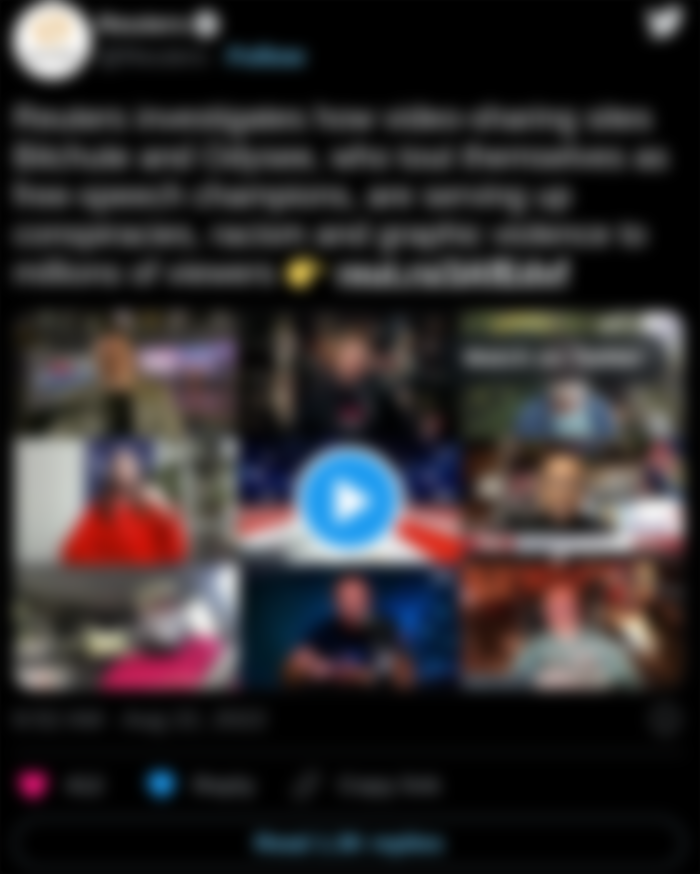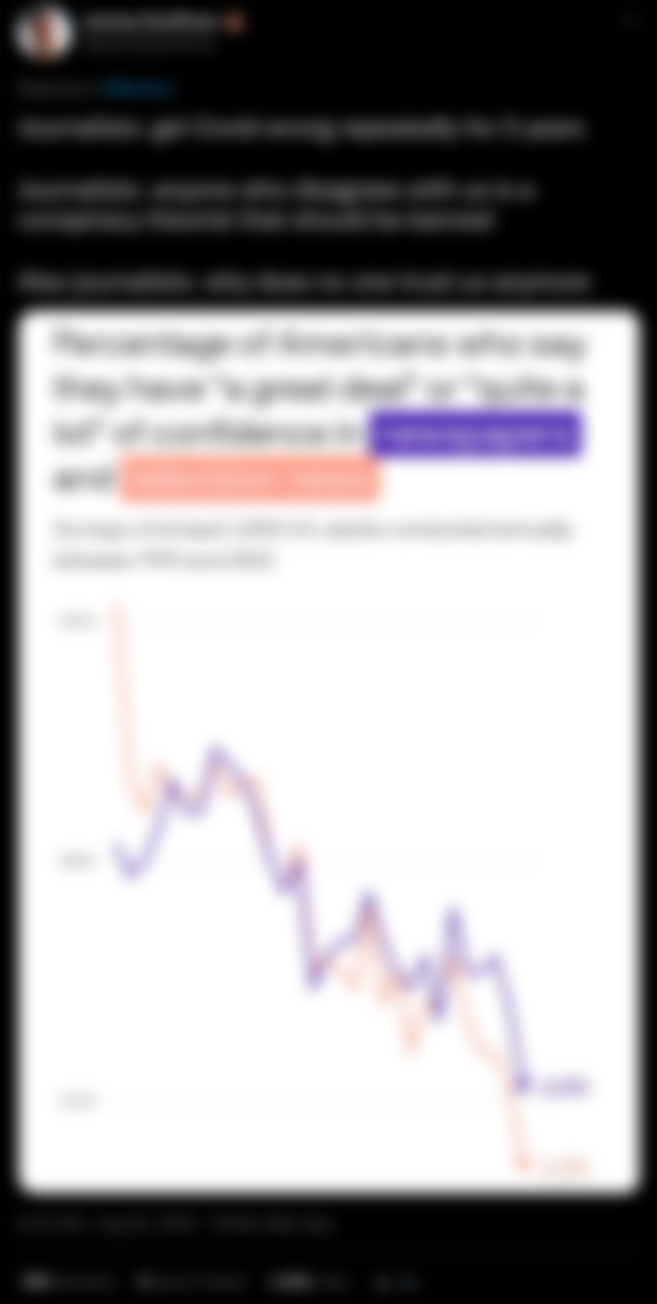Reuters Tries (and Fails) to Smear Alternative Content Platforms Odysee and BitChute
There are several alternative content and social media platforms nowadays. If you don't like Facebook or Twitter, there are Minds, Bastyon, and PeakD to name a few. YouTube being too censorious? There are Rumble, BitChute, and LBRY/Odysee. Each platform functions differently. Some have a utility token tied to user engagement and those tokens can be spent to boost content. Others emulate their mainstream counterparts, but with less spotty enforcement. While nowhere as large as YouTube or Twitter, they have established niches and are constantly growing.
It is the latter which apparently has Reuters spooked. On August 22, 2022, the outlet published an article of which many people labelled as a hitpiece on Odysee and BitChute. As it shared its article on Twitter, Reuters's corresponding tweet got ratio'ed as users called the publication out on its dishonesty.

Dissecting Reuters's Hitpiece
What is exactly wrong with Reuters's editorial? Well, lots. The overall tone is melodramatic full of flowery insults towards the founders of Odysee and BitChute. It pretends to be an investigative research report when it constantly cherry picks the worst apples of the bunch and portrays them as the average. For instance, Reuters name-dropped a guy by the name of Joseph Jordan who found the National Justice Party. I have been using Odysee for a few years and I never heard of this person until Reuters mentioned him. Admittingly, his viewership statistics are impressive after I did a bit of investigation. But even then, not once have I ever been recommended his videos or run into them whenever I look under "News & Politics".
To add on top of this point, not only was Reuters's cherry picking egregious, but the publication holds the alternative platforms to one standard while holding the mainstream platforms to a different one. As Kovichni aptly pointed out in his post, Twitter contains plenty of vile tweets that are not moderated. And to name a few other examples:
In the first example, a bunch of users tried to cancel an artist because they thought he was white and "had it easy". The second example contains a user accusing the manga/anime series "My Dress Up Darling" for depicting blackface because main female character, Marin, tanned her skin in order to better match a character she was going to cosplay. These are two clear instances of actual racism on Twitter, but you know... they don't count if the infraction comes from Reuters's "side".
The double standards also apply when it comes to "misinformation". Reuters claim that Odysee and BitChute spread a bunch of misinformation while Facebook, Twitter, and YouTube combat it, and the "established news organizations" are factual. However, this is far from the truth as documented by my past articles.
When I commented on former Press Secretary Jen Psaki's Bizarre Admission of Government Involvement in Facebook, I cited inconsistent enforcement as an argument against government curation of social media posts. Independent Allison Morrow uploaded a video of her explaining how NBC and CNN violated YouTube's "medical misinformation" rules. YouTube took down her video whereas NBC and CNN's original videos remained intact.
There was also that time when the mainstream media would immediately dismiss the COVID lab leak hypothesis and anyone who dared to posit such a theory would be suspended from Facebook, Twitter, etc. with prejudice. But suddenly, in May 2021, the hypothesis became more "acceptable". The same outlets that used to toss the lab leak hypothesis aside as a fringe conspiracy made an abrupt 180.
Or how about how Facebook admitted that its so-called "fact checks" are actually opinions? I can go on and on, but I think you get the idea at this point.
And apparently, YouTube suddenly took a 180 on masks, too.
Lastly, I noticed how the editorial didn't rag into Rumble as much. Sure, it criticizes the platform as it having "one foot in the febrile, pro-Trump world where the 2020 election was stolen and climate change doesn’t exist". On the other hand, the article also gives Rumble praise for having "mainstream ambitions and better financial backing, and the company moderates its content enough to make it palatable to app stores run by Apple and Google". Why does Rumble seem to get a pass when it's as "right-wing" (I would argue it's even more so) as Odysee and BitChute? Surely, there is no monetary reason behind its preferential treat-

Conglaturations, Reuters! You Activated the Streisand Effect!
I have to ask who on Reuters thought it was a good idea to green-light what is essentially a whine-fest of an editorial. Its audience is largely unfamiliar with alternative platforms like Odysee and BitChute. While they are exhibiting tremendous growth, they are still very niche compared to YouTube. So when Reuters name-drop these platforms to their once oblivious readers, it piques their interest.
While Odysee and BitChute's publicity from Reuters is negative, the publication's editorial comes during a time where American trust in mainstream news is at a historic low according to Gallup. Perhaps a few readers will be convinced that they are "dangerous" platforms. However, with how skeptical the majority of Americans are of mainstream media (I mean look how badly they bungled the Johnny Depp vs. Amber Heard trial or the Kyle Rittenhouse trial), their reaction is likely more along the lines of "Really? Let me be the judge of that".
The reason why these alternative platforms are growing is because they do not insult their audiences' intelligence. Odysee's stance to be hands off on the Russia-Ukraine conflict was not only ballsy, but also pivotal to nurturing an environment where people hear a variety of perspectives and not just the "acceptable" ones. As I articulated in my post:
Another thing to emphasize is that, in my opinion, there is no such thing as an unbiased news outlet. Each organization has its own views and agenda that it supports and the way how each presents the news will reflect that. In order to get a holistic view, one needs to read/listen from outlets of different political affiliations or otherwise, it will just be an echo chamber.
If anything, Reuters needs to tighten up its ethics or otherwise, it will join the likes of Brian Stelter's defunct "[un]Reliable Sources".




Great article. I agree there's no consistency when it comes to censorship or mainstream whining, unless there's something at stake. Proof: You could make a totally loony, over the top, conspiracy video on Youtube about for example how rivers are actually secret hydrogen nano-tunnels 🤣 or about lava-people who live in volcanos 🤣 and not only Youtube wouldn't bother with those conspiracies, you would most likely get promoted by the algorithm. But as soon as you mention Covid you'll immediately get demonetized.